MercoPress. South Atlantic News Agency
Tag: Dilma Rousseff
-
Monday, October 27th 2014 - 02:08 UTC
Dilma with Lula da Silva's magic, re-elected in rich-poor divided Brazil

Brazil's President Dilma Rousseff supported by the decisive campaigning of Lula da Silva, narrowly won re-election on Sunday after convincing voters that the record on poverty reduction in the last twelve years was more important than a recent economic slump.
-
Thursday, October 16th 2014 - 07:45 UTC
Brazilian presidential runoff in a neck to neck technical tie
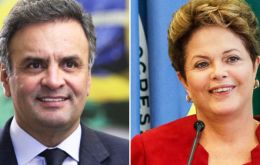
Brazilian president Dilma Rousseff and her challenger Senator Aecio Neves for the 26 October runoff, are technically tied according to the latest public opinion poll released by Datafolha, which so far has shown to be one of the most reliable pollsters.
-
Wednesday, October 15th 2014 - 23:44 UTC
Much mud-slinging but no definitive KO in Dilma/Neves first round of debates
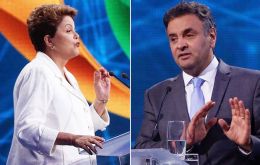
Brazilian President Dilma Rousseff and rival presidential candidate Aecio Neves have clashed over corruption and the state of the economy in the first of a series of televised debates ahead of the second round of presidential elections. 26 October.
-
Friday, October 10th 2014 - 05:18 UTC
Rousseff and Neves in 'statistical tie' according to the latest opinion polls
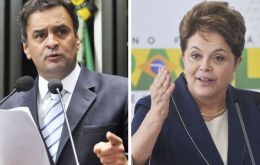
Pro-business candidate Aecio Neves has a slight lead of 2 percentage points over President Dilma Rousseff ahead of the October 26 runoff in Brazil's presidential elections, according to two new polls released on Thursday.
-
Saturday, October 4th 2014 - 10:38 UTC
Investors on edge waiting for the results of Sunday's voting in Brazil

Latin American currencies weakened on Friday after strong U.S. jobs data was seen as increasing the likelihood of higher interest rates in the world's largest economy, while Brazil markets fluttered in the last trading session before Oct. 5 elections.
-
Friday, October 3rd 2014 - 07:53 UTC
Latest poll shows Dilma winning the run off with seven point margin

Brazilian President Dilma Rousseff has extended her lead over environmentalist Marina Silva ahead of Sunday's Oct. 5 presidential election and would win a likely second-round runoff, a new poll showed on Thursday.
-
Thursday, October 2nd 2014 - 07:39 UTC
Dilma and Marina fighting for the religious vote, one fifth of the Brazilian electorate
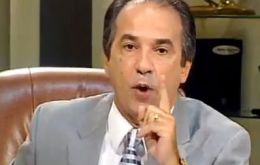
Brazil's rapid religious transformation is having an impact on the country's tight presidential race, where abortion and gay marriage have emerged as hot issues and Pentecostal televangelists are political power brokers.
-
Tuesday, September 30th 2014 - 04:40 UTC
Brazils' Bovespa and Real plunge as Dilma climbs in polls with less than a week to election

Brazilian financial markets took a beating on Monday after polls showed President Dilma Rousseff pulling past challenger Marina Silva ahead of Sunday's election. The Brazilian currency closed at its weakest level since December 2008 while the benchmark Bovespa stock index notched its biggest one-day loss in over three years.
-
Monday, September 29th 2014 - 09:16 UTC
Rousseff pledges media regulation (but not content) if re-elected this week

Brazilian president Dilma Rousseff, seeking re-election next week, says she will pursue media regulation if she returns for a second term, seeking to boost pluralism without influencing editorial content, according to media reports.
-
Monday, September 29th 2014 - 08:47 UTC
Opening the economy “would be a disaster for Brazilian industry” states Rousseff minister
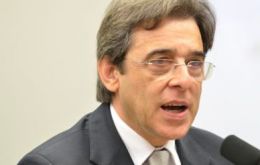
Anticipating what could be policy under a second government of President Dilma Rousseff, her Trade Minister Mauro Borges told Brazilian daily Folha do Sao Paulo that opening the country to more foreign trade would be a “disaster for Brazilian industry” and lead to the “mexicanization” of the economy, in reference to the light assembly factories known as “maquiladoras” that dominate Mexico’s non-oil exports.
